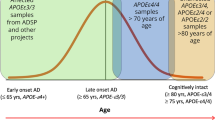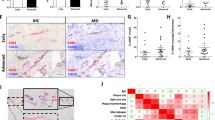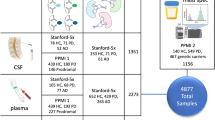Abstract
Primary familial brain calcification (PFBC), formerly known as Fahr disease, is a rare neurological disorder characterized by extensive calcification deposits in the brain. So far, four genes have been reported with variations associated with PFBC, SLC20A2, PDGFβ, PDGFRβ, and XPR1. Using real-time qPCR, we analyzed the expression of three inorganic phosphate (Pi) transporters (SLC20A1, SLC20A2, and XPR1) in patients with PFBC. Our results showed a significant reduction (~40%) of SLC20A2 expression in the patients carrying mutation whereas no significant change was observed within the patients without known mutations. No difference was detected in SLC20A1 and XPR1 expression between the groups compared to control. The results suggest that mutations in SLC20A2 gene by itself play an import role by reducing its expression in blood of PFBC patients. At the same time, we could not demonstrate a direct co-regulation between the three Pi transporters at mRNA level, once their expression did not change among the groups.


Similar content being viewed by others
References
Anheim M, López-Sánchez U, Giovannini D, Richard A, Touhami J, N’Guyen L, Rudolf G, Thibault-Stoll A, Frebourg T, Hannequin D, Campion D, Battini J-L, Sitbon M, Nicolas G (2016) XPR1 mutations are a rare cause of primary familial brain calcification. J Neurol 263:1559–1564
Bøttger P, Pedersen L (2011) Mapping of the minimal inorganic phosphate transporting unit of human PiT2 suggests a structure universal to PiT-related proteins from all kingdoms of life. BMC Biochem 12:21
Ferreira JB, Pimentel L, Keasey MP, Lemos RR, Santos LM, Oliveira MF et al (2014) First report of a de novo mutation at SLC20A2 in a patient with brain calcification. J Mol Neurosci 54(4):748–751
Giovannini D, Touhami J, Charnet P, Sitbon M, Battini J (2013) Inorganic phosphate export by the retrovirus receptor XPR1 in metazoans. Cell rep 3:1866–1873
Hsu SC, Sears RL, Lemos RR et al (2013) Mutations in SLC20A2 are a major cause of familial idiopathic basal ganglia calcification. Neurogenetics 14:11–22
Jensen N, Schrøder HD, Hejbøl EK, Füchtbauer E-M, de Oliveira JRM, Pedersen L (2013) Loss of function of SLC20A2 associated with familial idiopathic basal ganglia calcification in humans causes brain calcifications in mice. J Mol Neurosci 51:994–999
Jensen N, Autzen JK, Pedersen L (2016) SLC20A2 is critical for maintaining a physiologic inorganic phosphate level in cerebrospinal fluid. Neurogenetics 17:125–130
Keasey MP, Lemos RR, Hagg T, Oliveira JRM (2016) Vitamin-D receptor agonist calcitriol reduces calcification in vitro through selective upregulation of SLC20A2 but not SLC20A1 or XPR1. Sci rep 6:25802
Keller A, Westenberger A, Sobrido MJ et al (2013) Mutations in the gene encoding PDGF-B cause brain calcifications in humans and mice. Nat Genet 45:1077–1082
Legati A, Giovannini D, Nicolas G et al (2015) Mutations in XPR1 cause primary familial brain calcification associated with altered phosphate export. Nat Genet 47:579–581
Lemos RR, Oliveira MF, Oliveira JRM (2013) Reporting a new mutation at the SLC20A2 gene in familial idiopathic basal ganglia calcification. Eur J Neurol 20:e43–e44
Lemos RR, Ramos EM, Legati A, Nicolas G, Jenkinson EM, Livingston JH, Crow YJ, Campion D, Coppola G, Oliveira JRM (2015) Update and mutational analysis of SLC20A2: a major cause of primary familial brain calcification. Hum Mutat 36:489–495
Nicolas G, Pottier C, Charbonnier C et al (2013) Phenotypic spectrum of probable and genetically-confirmed idiopathic basal ganglia calcification. Brain a J Neurol 136:3395–3407
Villa-Bellosta R, Ravera S, Sorribas V, Stange G, Levi M, Murer H, Biber J, Forster IC (2009) The Na+−-Pi cotransporter PiT-2 (SLC20A2) is expressed in the apical membrane of rat renal proximal tubules and regulated by dietary Pi. Am J Physiol Renal Physiol 296:F691–F699
Wallingford MC, Gammill HS, Giachelli CM (2015) SLC20A2 deficiency results in fetal growth restriction and placental calcification associated with thickened basement membranes and novel CD13 and lamininα1 expressing cells. Reprod Biol 16:13–26
Wang C, Li Y, Shi L, Ren J et al (2012) Mutations in SLC20A2 link familial idiopathic basal ganglia calcification with phosphate homeostasis. Nat Genet 44:254–256
Zhang Y, Guo X, Wu A (2013) Association between a novel mutation in SLC20A2 and familial idiopathic basal ganglia calcification. PLoS One 8:e57060
Acknowledgments
We wish to thank Joana Ferreira and Matheus Oliveira for their valuable collaboration; Conselho Nacional de Desenvolvimento Científico e Tecnológico (CNPq) (457556/2013-7; 307909/2012-3; 400540/2013-4; 480225/2013-0; 310150/2016-7; 480255/2013-0); Pró-Reitoria para Assuntos de Pesquisa e Pós-Graduação - Universidade Federal de Pernambuco (UFPE) - INOVA-Saúde; L.F.P. and R.R.L. holds a fellowship grant from Fundação de Amparo à Ciência e Tecnologia do Estado de Pernambuco (FACEPE); Coordenação de Aperfeiçoamento de Pessoal de Nivel Superior (CAPES).
Author information
Authors and Affiliations
Corresponding author
Ethics declarations
Conflict of Interest
The authors declare that they have no conflict of interest.
Rights and permissions
About this article
Cite this article
Pimentel, L., Lemos, R. & Oliveira, J. Phosphate Transporters Expression in Patients with Primary Familial Brain Calcifications. J Mol Neurosci 62, 276–280 (2017). https://doi.org/10.1007/s12031-017-0934-9
Received:
Accepted:
Published:
Issue Date:
DOI: https://doi.org/10.1007/s12031-017-0934-9




